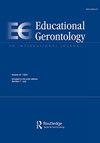参与老龄化:大学生与老年人的被动与主动访谈的影响
IF 1.5
4区 教育学
Q3 EDUCATION & EDUCATIONAL RESEARCH
引用次数: 0
摘要
摘要在老年护理劳动力日益短缺的时期,吸引新的工作者到该领域势在必行。很难让学生参与到这个领域中来。让学生关注老龄化问题的一种方法是通过口述历史作业。本研究探讨了主动任务(采访老年人)与被动任务(观看老年人接受采访的视频)对年龄歧视的影响。学生们被随机分配到在线老年学课程的两个部分。除了第一部分采访了一位老年人(n = 40),第二部分观看了一段老年人接受采访的视频(n = 37)之外,其他部分都是相同的。每个学生都完成了任务前和任务后的调查,其中包括年龄歧视量表。差异分析采用t检验和重复测量方差分析。结果:两个部分的年龄歧视都显著下降(从面试部分的平均56降到50,从视频部分的平均55降到47)。这一变化在各断面间差异不显著。两个小组都对作业表现出很高的满意度。两个部分的大多数学生(97%)报告说,他们能够将课堂课程与访谈联系起来,并且作业影响了他们对衰老的看法(95%)。结论:观看和积极参与面试对学生来说都是一项积极的任务,并导致年龄歧视的减少。在难以促进社区互动的课堂上,使用视频可能特别有用。披露声明作者未报告潜在的利益冲突。本文章由计算机程序翻译,如有差异,请以英文原文为准。
Engaging with aging: impact of passive vs. active interview with an older adult among undergraduate students
ABSTRACTDuring a time of increasing shortages in the eldercare workforce, attracting new workers to the field is imperative. It can be difficult to engage students in the field. One method to engage students with aging is through oral history assignments. This study explored the impact of an active assignment (interviewing an older adult) compared to a passive assignment (watching a video of an older adult being interviewed) on ageism. Students were randomly assigned into two sections of an online gerontology course. The sections were identical except one section conducted an interview of an older adult (n = 40), and the second section watched a video of older adults being interviewed (N = 37). Each student completed a pre- and post-assignment survey, which included an ageism scale. Differences were analyzed using t-tests and repeated measures ANOVA. Results: Ageism declined significantly for both sections (from an average of 56 to 50 for the interview section, and from 55 to 47 for the video section). The change was not significantly different across sections. Both sections reported high satisfaction with the assignment. A majority (97%) of students in both sections reported that they were able to relate class lessons to the interview and that the assignment impacted their thoughts about aging (95%). Conclusions: Both watching and actively participating in an interview was a positive assignment for students and resulted in a decrease in ageism. Using a video alternative may be particularly useful for classes where facilitating community interaction may be difficult. Disclosure statementNo potential conflict of interest was reported by the author(s).
求助全文
通过发布文献求助,成功后即可免费获取论文全文。
去求助
来源期刊

Educational Gerontology
Multiple-
CiteScore
2.50
自引率
13.30%
发文量
80
期刊介绍:
This well-respected journal offers up-to-date original research in the fields of gerontology, adult education, and the social and behavioral sciences. Researchers from around the world will benefit from the exchange of ideas for both the study and practice of educational gerontology. Papers published in the journal will also serve as authoritative contributions to the growing literature in this burgeoning field. Educational Gerontology is the only international journal of its kind to publish twelve issues per volume year. Articles featuring outcome-based practical educational resources in gerontology for the educational professional, care provider, trainer, and student in such areas as: art, music, drama and recreational therapies; mental health, communication arts, social programs and policies; and, social work, nursing, physical and occupational therapies, financial planners, architecture and interior design, family relations and therapy, and religion and spirituality.
 求助内容:
求助内容: 应助结果提醒方式:
应助结果提醒方式:


